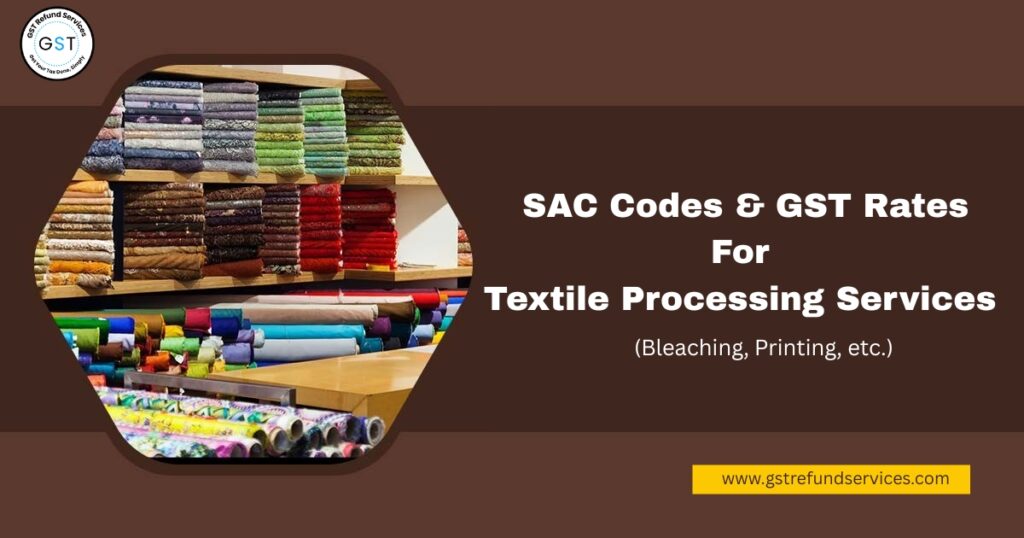Central Goods and Services Tax (CGST) officials in the recent months have investigated over two dozen textile manufacturing companies across the country for mis-classifying textile processing activities and subsequently paying lesser tax.
According to official sources, the CGST department has observed that several textile manufactures are recording activities which involve ‘changing the nature of cloth’ as ‘washing and dyeing’ and therefore are paying lower tax rate of those incomes.
Under the GST laws, washing and dyeing are considered as ‘job work services’ in the textile industry and attract a GST rate of 5%; while processes that significantly transform the fabric, such as bleaching, printing, or other treatments that alter its essential characteristics, attract a GST rate of 18%.

Textile processing services like bleaching, printing, and finishing treatments are classified under the GST Service Accounting Code (SAC) 998821 – “Textile manufacturing services” (job work on textiles).
The applicable GST rates depend on whether the process qualifies as job work in relation to textiles (concessional 5%) or falls outside the concessional category (18% standard rate). Recent GST notifications and circulars have updated the treatment of certain processes (notably printing and dyeing). Below are the latest SAC codes and GST rates for each specified activity, with references to official notifications/circulars:
- Bleaching of Cloth – SAC 998821 (Textile manufacturing services). Bleaching (e.g. converting grey fabric to bleached cloth) is treated as a textile job work service, which attracts 5% GST under
Notification No. 11/2017 (Serial No.26(i)(b)). This falls under the concessional rate for job work in relation to textile products (Chapters 50–63 of the tariff). Key point: Bleaching is still eligible for the 5% job-work rate and has not been singled out for removal from this category by recent amendments. (If the service is provided on cloth owned by an unregistered person – not fitting the
definition of “job work” – it would be taxed at the general 18% rate as a manufacturing service on others’ goods.) - Printing of Cloth – SAC 998821. Originally, printing on textiles (e.g. all-over fabric printing) was also covered under the 5% job work category. However, as per Notification No. 15/2021-Central Tax (Rate) (effective Jan 1, 2022), printing (and dyeing) services on textile goods were excluded from the 5% job-work rate. This means the printing of cloth no longer qualifies for the concessional rate. Now, if a printer processes fabric owned by another:
If the service qualifies as “job work” (principal is registered): GST is 12% (under the general job-work
rate introduced for such services). [This 12% rate comes from the insertion of entry 26(id) in Notification 11/2017, which reduced GST on job-work services (not otherwise specified) from 18% to 12%.] In other words, fabric printing done for a registered textile manufacturer is taxed at 12% after
the 2022 amendment.
If the service is done for an unregistered customer (not meeting the “job work” definition): GST is 18% as it falls under “manufacturing services on physical inputs owned by others (other than job
work)”.
References: The amendment to entry 26(i)(b) of Notification 11/2017 inserts “except services by way of dyeing or printing of the said textile products,” thereby removing textile printing from the 5% slab. As a result, fabric printing jobs are taxed at the standard rate (12%/18% as above) instead of 5%. For instance, industry guidance now notes that printing on cloth is taxable at 18% in general, and only 5% if it was part of the earlier job-work chain which has since changed. - Other Treatments on Cloth (e.g. mercerizing, waterproofing, fireproofing, coating, etc.) – SAC
- These finishing or coating services are considered part of textile processing and generally fall under the 5% GST job-work rate when performed as a treatment on goods belonging to a
registered textile manufacturer. They are not explicitly excluded by the 2021 amendment (which targeted only dyeing and printing). For example, processes like mercerizing, water-proofing, flame – proofing, coating or calendaring of fabric would be taxed at 5% GST as job work in relation to textiles, so long as they are provided independently. However, if such processes are carried out in combination with dyeing or printing as a single composite job-work contract, they would be taxed at the higher rate applicable to the principal service (since the dyeing/printing would dominate the
supply). In other words, ancillary treatments performed along with printing/dyeing get “bundled” and taxed at 12%/18% as per the printing service, whereas if they are standalone services (on fabric under Chapters 50–63) they retain the concessional 5% rate.
References:
Notification No. 11/2017-Central Tax (Rate), Sr. No. 26(i)(b) – Job work services for textiles and textile products (Ch. 50–63) at 5% GST. (Bleaching, finishing, etc., fall in this category.)
Amended by Notification No. 15/2021-Central Tax (Rate) dated 18-Nov-2021 – inserts “except dyeing or printing” in entry 26(i)(b), removing textile printing (and dyeing) from the 5% rate w.e.f. Jan 1, 2022. Such printing/dyeing services now fall under the general rate for manufacturing services.
Circular No. 126/45/2019-GST (CBIC) – Clarified that “job work” means processing of goods belonging to a registered person; a new entry 26(id) was introduced (Oct 2019) to tax all other job work services at 12% (instead of 18%). Entry 26(iv) (18%) then covers only processing of goods of unregistered owners. This framework explains why printing on cloth now attracts 12% if done for a registered principal, but 18% if for others.
Official GST Clarifications/Press: The GST Council’s 45th/46th meeting decisions and subsequent notifications affirmed the above: job-work services in relation to textile products continue at 5%, except for dyeing and printing which are taxed at the applicable higher rate from 2022 onward. Tax authorities have since cautioned the industry against misclassifying major transformative processes as mere “job work” to wrongly apply 5%—e.g. bleaching, extensive printing or coating that significantly change the fabric are expected to be taxed at 18% if not rightly classified. Always refer to the latest CBIC notifications and circulars for confirmation. The GST portal’s tax rate search can also be used with SAC 998821 to verify the current applicable rate for specific textile processing services. Central Goods and Services Tax (CGST) officials in recent months have investigated over two dozen textile manufacturing companies across the country for mis-classifying textile processing activities and subsequently paying lesser tax.
According to official sources, the CGST department has observed that several textile manufacturers are recording activities which involve ‘changing the nature of cloth’ as ‘washing and dyeing’ and therefore are paying lower tax rate of those incomes.
Under the GST laws, washing and dyeing are considered as ‘job work services’ in the textile industry and attract a GST rate of 5%; while processes that significantly transform the fabric, such as bleaching, printing, or other treatments that alter its essential characteristics, attract a GST rate of 18%.


